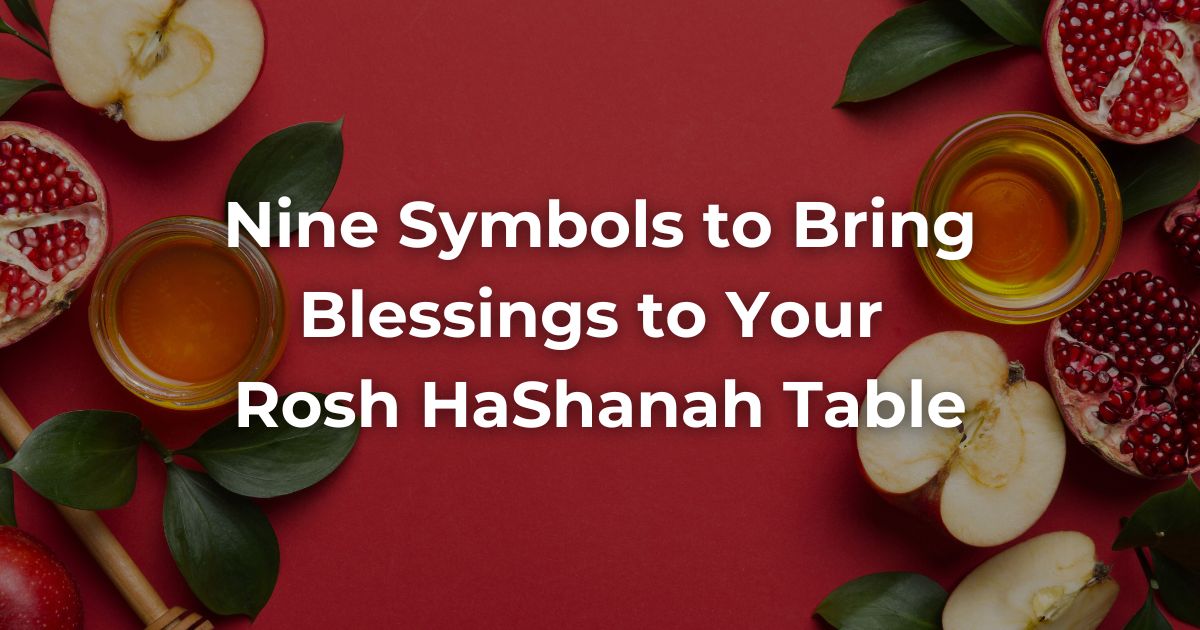A time-honored Jewish holiday practice imbues food with symbolic significance for the upcoming year: the attribution of simanim, “symbols.” By participating in this tradition, we eat our wishes and connect with God through food, intertwining words with flavors and emotions.
This practice occurs especially during Pesach, Shabbat, Tu BiShvat, and Rosh HaShanah, transforming our table into an altar and creating a communal experience through faith, prayer, and eating, as we envision a better future.
While many of these traditions originate from Sephardic heritage, they have transcended cultural boundaries to grace Jewish tables around the world. The symbols may vary from one community to another, but they often aim to eliminate hatred and bad omens, reflecting the strong impact of antisemitism over the centuries.
While this custom may appear to border on superstition, it is actually a way to avoid pagan practices by placing God at the center rather than the food itself. We don’t experience a sweet year simply by eating honey; it is faith that guides our actions and these symbols are a way to connect with the divine with all our senses, our body and soul.
1. Dvash (Honey)
Dipping apples in honey is one of the most well-known Rosh HaShanah traditions. While “the land of milk and honey” refers to dates and fig syrup rather than bee honey, the sentiment remains: we wish for a year as sweet as honey.
יְהִי רָצוֹן מִלְּפָנֶיךָ ה’ אֱלֹהינוּ וֵאלֵֹהי אֲבוֹתֵינוּ וְאִמוֹתֵינוּ, שֶׁתְּחַדֵּשׁ עָלֵינוּ שָׁנָה טוֹבָה וּמְתוּקָה:
Yehi ratzon milfanecha Adonai eloheinu v’elohei avoteinu (v’imoteinu), shetechadesh aleinu shanah tovah u’metukah
May it be Your will, our God and God of our ancestors, that You renew for us a year that is good and sweet!
2. Challah Hagulah (Rounded Bread)
The round challah served during the High Holidays symbolizes the circle of life and the ongoing seasons. As we pray to be inscribed in the Book of Life, this rounded challah represents the year as a whole and the never-ending cycle of life.
Challah blessing (HAMOTZI):
בָּרוּך אַתָּה ה׳ אֱלֹהֵינוּ מֶלֶך הָעוֹלָם הַמּוֹצִיא לֶחֶם מִן הָאָרֶץ:
Baruch ata Adonai, eloheinu melekh ha-olam, hamotzi lechem min ha’aretz.
Blessed are You, Lord our God, King of the universe, who brings to us bread from the earth.
3. Rosh (Fish Head)
Rosh HaShanah literally means “Head of the Year.” By placing a head on your plate, you declare your intention to be the “head” and not the “tail.” A lettuce head can be used as a vegetarian alternative. We don’t need to aspire to be political figures or community leaders, but we should strive to take charge of our own lives.
יְהִי רָצוֹן מִלְּפָנֶיךָ ה’ אֱלֹהינוּ וֵאלֵֹהי אֲבוֹתֵינוּ וְאִמוֹתֵינוּ, שֶׁנִּהְיֶה לְרֹאשׁ וְלֹא לְזָנָב:
Yehi ratzon milfaneḥa, Adonai eloheinu v’elohei avoteinu v’imoteinu, shenihiyeh lerosh v’lo lezanav.
May it be Your will, our God and God of our ancestors, that we be like a head and not a tail.
4. Tamar (Dates)
The Hebrew word “Tamar” resembles the Hebrew word yitamu, which means “end.” Our wish is not for lives to end, but for hatred to cease. By reciting this blessing and eating dates, we hope for the end of those who wish evil upon us.
יְהִי רָצוֹן ה’ אֱלֹהינוּ וֵאלֵֹהי אֲבוֹתֵינוּ וְאִמוֹתֵינוּ, שֶׁיִּתַּמּוּ אוֹיְבֵינוּ וְשׂוֹנְאֵינוּ וְכָל מְבַקְשֵׁי רָעָתֵנוּ:
Yehi ratzon milfaneḥa, Adonai eloheinu v’elohei avoteinu, she’yitamu oyveinu v’soneinu v’chol m’vaskshei ra’ateinu.
May it be Your will, our God and God of our ancestors, that there will be an end to our enemies, haters, and all those who wish us evil.
5. Rubia (Green Beans)
The Hebrew word “Rubia” resembles yirbu, increase. We ask that our merits multiply, leading us toward prosperity. This blessing expresses a desire for a life of abundance.
יְהִי רָצוֹן ה’ אֱלֹהינוּ וֵאלֵֹהי אֲבוֹתֵינוּ וְאִמוֹתֵינוּ, שֶׁיִּרְבּוּ זְכֻיוֹתֵינו:
Yehi ratzon milfaneḥa, Adonai eloheinu v’elohei avoteinu, sheyirbu zechuyoteinu
May it be Your will, our God and God of our ancestors, that our merits shall increase and that You hearten us.
6. Karti (Leeks)
If we cannot change our enemies’ hatred, we can at least pray for their plans against us to be thwarted. The Aramaic word karti is similar to the Hebrew term karet, meaning “cut.” This prayer asks for our enemies’ intentions to be severed and rendered ineffective.
יְהִי רָצוֹן ה’ אֱלֹהינוּ וֵאלֵֹהי אֲבוֹתֵינוּ וְאִמוֹתֵינוּ, שֶׁיִּכָּרְתוּ אוֹיְבֵינוּ וְשׂוֹנְאֵינוּ וְכָל מְבַקְשֵׁי רָעָתֵנוּ:
Yehi ratzon milfaneḥa, Adonai eloheinu v’elohei avoteinu, she’yikartu oyveinu v’soneinu v’chol m’vakshei ra’ateinu
May it be Your will, our God and God of our ancestors, that our enemies, haters, and all those who wish us evil shall be cut off.
7. Selek (Beets)
The most powerful wish is for peace. The Aramaic and Hebrew word selek sounds like silek, to depart; we pray for our enemies to leave us in peace.
יְהִי רָצוֹן מִלְּפָנֶיךָ ה’ אֱלֹהינוּ וֵאלֵֹהי אֲבוֹתֵינוּ וְאִמוֹתֵינוּ, שֶׁיִּסְתַּלְּקוּ אוֹיְבֵינוּ וְשׂוֹנְאֵינוּ וְכָל מְבַקְשֵׁי רָעָתֵנוּ:
Yehi ratzon milfaneḥa, Adonai eloheinu v’elohei avoteinu, sheyistalku oyveinu vesoneinu vekol mevakshei ra’ateinu.
May it be Your will, our God and God of our ancestors, that our enemies, haters, and all those who wish evil upon us shall depart.
8. K’ra (Squash or Pumpkin)
The Aramaic word k’ra is reminiscent of the Hebrew words kriah, to tear, and kara, to announce. We pray that our enemies’ desires be torn apart and that our merits be proclaimed. By offering this prayer, we express confidence that good deeds will prevail over evil intentions.
יְהִי רָצוֹן מִלְּפָנֶיךָ ה’ אֱלֹהינוּ וֵאלֵֹהי אֲבוֹתֵינוּ וְאִמוֹתֵינוּ, שֶׁתִּקְרַע רוֹעַ גְּזַר דִּינֵנוּ, וְיִקָּרְאוּ לְפָנֶיךָ זְכֻיוֹתֵינוּ:
Yehi ratzon milfaneḥa, Adonai eloheinu v’elohei avoteinu, shetikra roa gezar dineinu, veyikaru lefanecha zechuyoteinu
May it be Your will, our God and God of our ancestors, that the evil of our verdicts be ripped up, and that our merits be announced before you.
9. Rimon (Pomegranate)
Pomegranates hold deep significance in Jewish tradition. Their seeds symbolize the 613 mitzvot, representing the TorahRefers to the first five books of the Hebrew Bible, the Tanakh, also called the Five Books of Moses, Pentateuch or the Hebrew equivalent, Humash. This is also called the Written Torah. The term may also refer to teachings that expound on Jewish tradition. Read more, the land of Israel, and fertility. If our lives are filled with mitzvot, we can expect good things to come naturally.
יְהִי רָצוֹן מִלְּפָנֶיךָ ה’ אֱלֹהינוּ וֵאלֵֹהי אֲבוֹתֵינוּ וְאִמוֹתֵינוּ, שֶׁנִּהְיֶה מְלֵאִים מִצְוֹת כָּרִמּוֹן:
Yehi ratzon milfaneḥa, Adonai eloheinu v’elohei avoteinu, shenihiyeh melei’im mitzvot karimon.
May it be Your will, our God and God of our ancestors, that we be filled with mitzvot like a pomegranate (is filled with seeds).
Author
-

Journalist. Msc. in Anthropology. She was a fellow in the first cohort of the Exploring Judaism's Writer's Fellowship. South American Rabbinical Student in Europe. Mother of two fantastic daughters. Love to practice yoga, meditate and to cook for family and friends. Currently doing research on food & identity for Phd on Jewish Theology at Paderborn University, Germany.
View all posts




